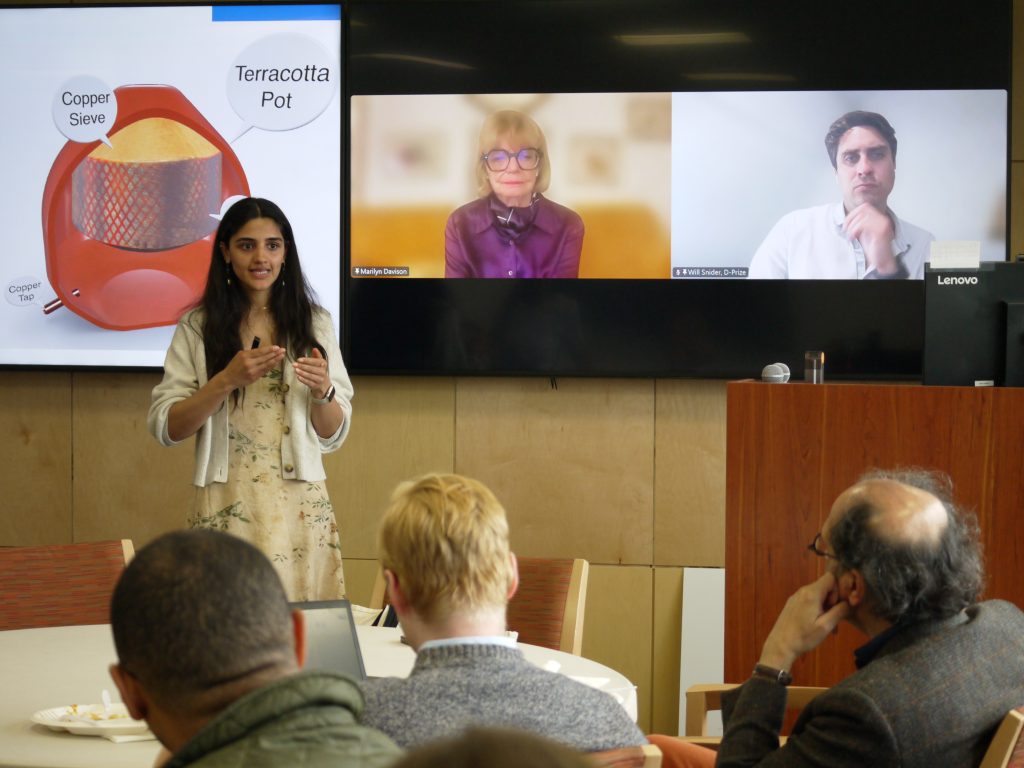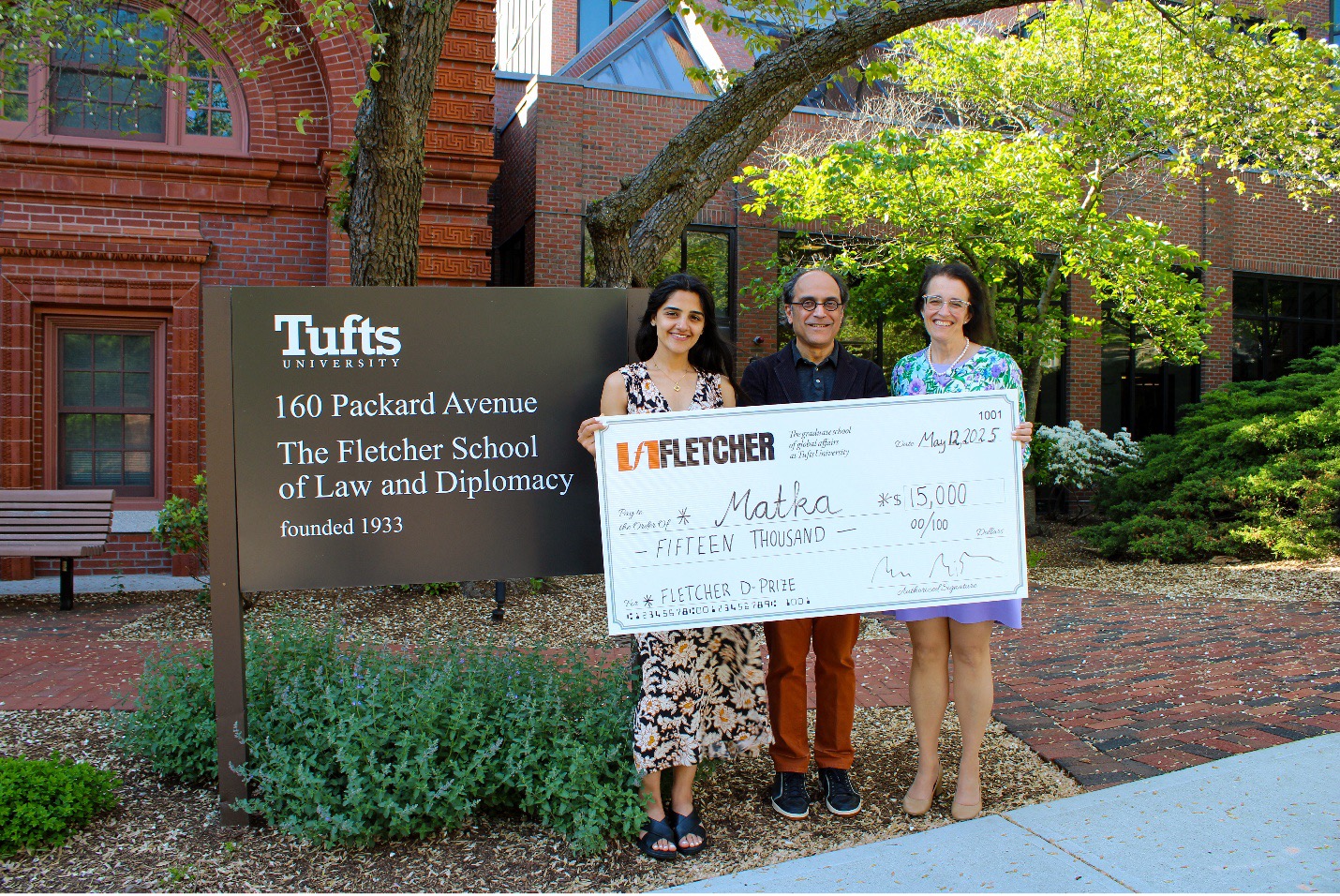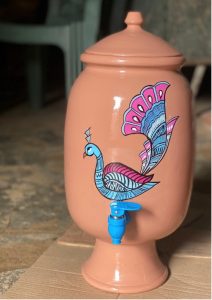
From Clay Pots to Clean Water: D-Prize Winner Dure Nayab’s Matka Tackles Rural Punjab’s Water Crisis
In rural Punjab, Pakistan a centuries-old tradition meets 21st-century innovation. Dure Nayab F25’s Matka harnesses the humble clay pot as the foundation for an affordable, sustainable water filter.
“I was inspired by a gap and by a lack of use of a very beautiful traditional art form,” Nayab said.
Her innovative approach recently earned her the Fletcher D-Prize, a prestigious social entrepreneurship competition launched in 2013 that supports proven poverty interventions by connecting entrepreneurs with experienced venture capitalists.
Combining Art, Tradition and Innovation
Born in Punjab, Nayab recognized a striking disparity: while cities saw advances in water treatment, rural areas suffered persistent contamination.
“There was a gap where the problem is simple,” she said. ”But solutions don’t exist, and existing solutions are too pricey.”
Her breakthrough came during a 2019 trip to Guatemala, where she encountered Ecofiltro, a successful clay-based water filtration social enterprise. Inspired, she studied the model for her final project in Fletcher’s Strategic Management class.
Ecofiltro’s design reminded her of the traditional pottery at home.
“My grandmother is from a village in Punjab,” Nayab recalls. “She would use pottery pots all the time to store water to keep it cool and clean.”
Matka Prototype
This memory sparked her vision to revive a traditional method, adapting it into a filtration system tailored for Punjab’s needs.
An additional motivation was preserving pottery as an art.
“People from this region are known for their pottery-making skills,” Nayab said.
To realize her vision, Nayab collaborated with a small pottery workshop in her grandmother’s village, creating prototypes from terracotta, copper, and jute fibers, locally sourced materials that enable a passive filter requiring no power, maintenance or chemicals. Matka literally means “earthen pot” in Punjabi.
Nayab’s sister, an engineer based in Pakistan, manages on-the-ground operations and communications for Matka.
Doing business with international eyes
Before Fletcher, Nayab attended Babson College, where she learned entrepreneurial frameworks anchored mainly in U.S. business models.
“In undergrad, I learned a lot of useful frameworks for entrepreneurs,” she says, “but Fletcher offered much broader perspectives, encompassing different international communities.”
Her project vividly illustrates this expansive view.
“Dean Bhaskar Chakravorti really helped me shape my distribution centers,” Nayab said.
She learned from Chakravorti that in rural South Asia, “women are the early adopters and decision makers,” leading her to incorporate women as key distributors.
Nayab credits two of her mentors, Professor Rocky Weitz and Professor Ken Pucker, for playing pivotal roles. Each played a pivotal role: Professor Weitz stressed the importance of presenting a tangible prototype, while Professor Pucker offered expertise in sustainable solutions.
“They really helped me position myself in a way that works for my consumers, my target market and my investors,” Nayab said.
A solution rooted in community
Matka’s strength lies in its deep community roots.
“It’s about creating something that communities own and trust — because only then can change be lasting,” Nayab emphasizes.
The other reason that Matka stood out, according to Nayab, was her adaptability.
“One of the judges said what impressed him was how flexible we were and how well we incorporated the feedback,” she recalls. “I was really good at taking criticism when it’s constructive, and I ask for it.”
By partnering closely with artisans and mobilizing women as distributors, Nayab designed a model that not only improves health outcomes but also fosters economic and gender empowerment.
“Things come together when you involve the community,” she said, “and entrepreneurship is not something that you do in isolation.”
Now, with the D-Prize award, she has secured funding to scale the distribution of Matka.
With pilot programs underway and long-term plans for scaling production, Matka is poised to bring cleaner water and renewed hope to rural Punjab, one jug at a time.


